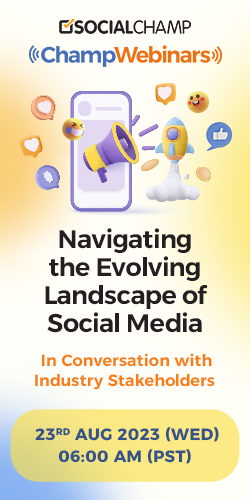Social media is about sociology and psychology more than technology.– Brian Solis
Most of social media marketing teams don’t rely on a heavy budget to spend on their advertising campaigns on Facebook, in fact, it is a medium which always has room to save money while boosting the ROI rather than other social media advertising platforms.
If you’ve just started with your Facebook Business Page, before continuing with this, we would recommend you to read our Beginner’s Guide to Facebook Marketing.
#1 Defining Your Goals and Key Performance Indicators (KPIs)
We don’t have a choice on whether we do social media, the question is how well we do it. – Erik Qualman
Once you have defined goals & KPI, the next thing is to make sure that all your Facebook ad content is working in the same direction to support these objectives. How you are establishing your benchmarks or what is your definition of success might be different from how another brand/company’s define success.

As we have discussed before in our Expert Guide to Facebook Advertising Strategy For 2018, the tips, tricks, and hacks focused on getting sales, attracting an audience and increasing traffic on your business website.
With Facebook, you can now easily target Spanish and English speaking prospects, between the ages of 22-35, who live in a 20-mile radius of Newark and are looking for social media marketing solutions by Facebook Ad targeting. Some of the metrics could include Reach, Audience engagement, Site traffic, Leads, Sign-ups and conversions & Revenue.
The feature “When You Get Charged” needs your attention. It will let you determine your KPIs, let you choose between impressions, content-specific objectives, link clicks, or other format-specific options that are more cost-effective than compared to the one charged by per impression or link click.
When you are on such a small budget make sure that all the modules of your content are specified towards the predefined objectives. An actionable CTA can let your audience know what their next step would be. If you’re counting on every dollar and want to make the most of your money as well as an ad, don’t kill your opportunities for conversion by neglecting a Call-to-Action button.
#2 Repurposing your Top performing Content
Engage, Enlighten, Encourage and especially…just be yourself! Social media is a community effort, everyone is an asset.– Susan Cooper
If any of your previous content has performed really well and has got a higher than average amount of engagement, it is a good indicator that it would work even better with a budget behind it. Many social media marketing experts suggest that when you’re working with a limited budget of $100, it is recommended not to take the risk with untested content or spending time in creating brand new ads.
Looking at the organic reach of your content such as how many comments, likes, link clicks or if it is a video, how many views it had within 24 hours. There is a good chance that it will do well as a Facebook ad if something is resonating. Instead of creating another brand new ad you can simply boost any of your previous top-performing posts with the feature “Boost Post,” to get the most out of your campaign.
Repurpose Content With Social Champ
Repurpose evergreen content on social media by tweaking it according to different platforms within Social Champ’s content dashboard!
#3 Targeting Existing & Potential Audiences
Social media is just a buzzword until you come up with a plan.@socialchampsays
Working and planning with a limited budget like $100, makes you super conscious about the audience you’re targeting. Make sure that you’re targeting the best potential audience for your brand/company. Be realistic & search thoroughly to be as precise as possible. With this budget, you don’t need to waste your money by reaching out to people globally.
To get better and optimal results from your campaign try to localize your target audience. You can rule within smaller geographic regions by doing proper research on how people are interacting with your brand on Facebook. If most of the conversions are coming from mobile users than we shouldn’t target desktop users to boost resourcefulness & ROI with smaller campaigns.

Once understanding the audience, you’re trying to reach, be strategic while setting them up. The two simple ways to do so are:
- Building a custom audience & retargeting existing users who have visited or signed up previously.
- Creating a doppelganger audience while keeping the existing audience in mind.
“To determine whether your audience is properly defined, pay attention to the gauge in your Facebook Ads manager dashboard.”
Your audience should be in Goldilocks’ situation. Not too broad, and not too specific. @socialchampsays
It will take a little time & adjustment till you hit the sweet spot, irrespective of your budget.
“It’s important to know how success is defined for your business.”
When you are building your audience, it is important to define your objectives before. Your objectives are the main entity that would impact everything with your Facebook ad campaign. If generating leads or conversions is your main objective then you can compare two groups of audiences to see which one is more successful so that you can reallocate your budget to the successful audience.
“Trustworthy content has a balanced point of view. It asks and answers the right questions. It doesn’t love itself. It tries to inform and educate.” – Steve Farnsworth
#4 Posting the Ad & Content on the Right Time
“Managing a Facebook Business Page also requires posting the content at the right time, and interaction with the followers and visitors. For this, there are some tools available to manage your Facebook account, schedule posts, get analytics and develop your upcoming strategies.
One of the emerging Social Media Scheduling and Management Tool is Social Champ, which is the perfect tool for small and medium scale businesses who are looking for unique features to get ahead of the game.’
To boost your Facebook page’s engagement with stunning Facebook ads, you can also use many AI-powered and flexible ad templates to make unique and eye-catching Facebook video ads.
#5 Monitoring and Optimizing Performance
One of the biggest mistakes most social media marketing managers do is forget or sometimes not know how to monitor their ads. When working with such a small budget, it becomes crucial to monitor your ad performance.
“Social media is about the people! Not about your business. Provide for the people and the people will provide you.” – Matt Goulart
You can use Facebook Pixel and UTM parameters to track your data & conversions from your Facebook ads. This will help you in getting a deeper insight into the performing content, & find out the audiences who are sucking up the budget but are not in the mode of converting. By re-adjusting them a little bit you can boost ROI.
Since with $100 you won’t have many testing opportunities, but by increasing your budget to $200 you can conduct treasured valuable A/B tests.
You can build your future ad campaigns by testing out & collecting the data using different copies, images, & formats. Another strategy can be using the same image with different messages or copies to test two different ads with the same budget and compare which one is getting better results so that you can shut down the low performer ad.
If you want to read further about Facebook Ads by an expert in the field, you can read Social Champ’s interview with Dennis Yu, an internationally perceived lecturer in Facebook Marketing.
To Sum Up with Spending $100 Budget Wisely!
Let’s see how we can save our time and money and run an effective & successful Facebook advertising campaign with a minimum budget of $100.
What we learned to do with this budget is
- To look at your previous social media content
- Targeting your precise potential audience
- Repurposing your top-performing content
- Focus on the key metrics to track
- Keep an eye on your Ad’s performance
In the end, making smart decisions is more important than the size of the budget when it comes to run a successful Facebook Ad Campaigns.
“Social media allows big companies to act small again” – Jay Baer



















